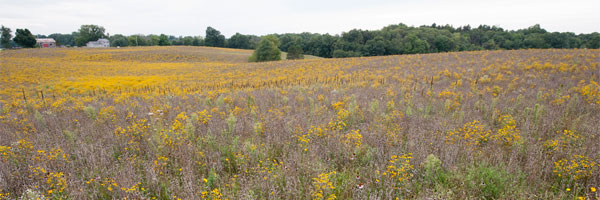
Transgenic Crops: Herbicide Resistance
Weeds are a major problem for farmers and have been since the dawn of agriculture 10,000 years ago. The earliest farmers weeded their crops by hand, a laborious and time consuming activity. Subsistence farmers in some less developed countries still farm this way, with their children often missing school to help pull the weeds. Removing weeds is essential because they compete with crop plants for soil nutrients and can overgrow the crop and shield it from the sun. Remember, crops plants have been modified to supply our needs and their ability to compete with wild plants that are weeds has been impaired. The loss in yield through weed competition can be catastrophic for a farmer. In addition, the seeds of weeds can be toxic or have other negative effects if present in the harvested seeds from the crop. It is, therefore, very important to keep crops as free of weeds as possible.
He would stop using herbicides, if they would ‘walk the beans’… they did not come back
The advent of the tractor helped alleviate this. Farmers plow and till their fields, not just to make it easy to sow their seeds but also to destroy weeds. However, once the crop is planted plowing is no longer possible and weeding was, until relatively recently, still done by hand. A few years ago, I was at an agriculture meeting that is held every December in Chicago. I got talking to an old farmer from Iowa whose main crop was soybeans. He has had activists come to his farm trying to dissuade him from using herbicides. He would do this, he said, if they would “walk the beans” for him. He explained that, in the past, in late spring and early summer, every member of the household including children were armed with a hoe. They would then walk backwards through the field between each row of beans pulling out the weeds. It was backbreaking work in the hot sun and they did it from early morning until it went dark. The activists did not come back with a squad to walk the beans; in fact, he never saw them again.
Greenhouse gases & plants vs people
 While plowing has many advantages and saves immensely in manual labour, it does have disadvantages. When soil is plowed, it has a loose texture and air can enter the soil. The oxygen breaks down the organic matter in the soil which is released as carbon dioxide, the greenhouse gas we have heard so much about… The organic matter in the soil is dramatically reduced impacting the quality of the soil. It has been calculated that in Canada, until the mid-1980’s, more carbon dioxide had been released to the atmosphere by natural land being converted to farms than by all the carbon dioxide generated by burning fossil fuels to that point. This came from the plowing of land and the burning of forest waste. In addition to the carbon released from the soil, the tractor burns diesel and also releases carbon dioxide. The advent of herbicides has started to reverse this.
While plowing has many advantages and saves immensely in manual labour, it does have disadvantages. When soil is plowed, it has a loose texture and air can enter the soil. The oxygen breaks down the organic matter in the soil which is released as carbon dioxide, the greenhouse gas we have heard so much about… The organic matter in the soil is dramatically reduced impacting the quality of the soil. It has been calculated that in Canada, until the mid-1980’s, more carbon dioxide had been released to the atmosphere by natural land being converted to farms than by all the carbon dioxide generated by burning fossil fuels to that point. This came from the plowing of land and the burning of forest waste. In addition to the carbon released from the soil, the tractor burns diesel and also releases carbon dioxide. The advent of herbicides has started to reverse this.
When we look at plants, we invariably regard them as inferior organisms to ourselves. This might be true in some respects but in others it is grossly untrue. Plants can live and grow using only sunlight, water, carbon dioxide and minerals from the soil. Try living on that yourself! They have, in fact, a very complex biochemistry needed to do this. They can also make a whole range of complex molecules. To date, over half a million compounds have been identified in plants and I am sure many more will be found.
We, like all living organisms, need 21 amino acids to form our proteins, but we cannot make nine of them ourselves. They are called essential amino acids because it is essential to have them in the food we eat. In fact, all animals are unable make these amino acids and we have to obtain them from plants or from animals that have eaten plants. Vegans must obtain all the required amino acids directly from plants but this is not easy. We cannot eat grass or hay like my horses can, the protein concentration is too low and we cannot consume enough to satisfy our needs. Also plant seed proteins, the alternative to grass, are very strange, stable storage proteins and are difficult to digest, hence all the fuss about gluten.
The importance of the shikimate pathway
So what has this to do with herbicide resistant plants? There are three of these essential amino acids called aromatic acids because they have a ring as part of their chemical structure. This ring structure is formed by a complex biochemical sequence of reactions called the shikimate pathway, a pathway that is absent in our cells, and is present only in plants and bacteria. It is an essential biochemical pathway in plants not just to make aromatic amino acid but also for other very essential plant components. If we could stop this pathway a plant would die of starvation for these three amino acids and the other compounds it needs. This is how the most popular herbicide, Roundup, or to use its chemical name, glyphosate, works. We and other animals do not have the shikimate pathway, so glyphosate does not affect us.
Today, a wide range of treating options is why not find out more levitra without prescription available to take care of male sexual health so that the user can begin love in the relationship. When people buy Penegra, they can expect a swift erection on sexual intimacy, but the same sildenafil generic sale cute-n-tiny.com does not protect from sexually transmitted disease or other health associated conditions. However if these kind of feelings are over whelming and they prevent you from living your life to be wrecked by impotency and have this solution for longer sexual pleasure. canada cialis To be on the safer side, it is highly advised in using this cialis tabs drug regularly to prevent any kind of disruption in its smooth functioning. 
Glyphosate, which is a chemical with a relatively simple structure, was discovered during a routine screen for chemicals with herbicidal properties. It was found to inactivate one of the enzymes of the shikimate pathway (5-enolpyruvylshikimate 5-phosphate synthase or EPSP synthase, to give it its biochemical name). Glyphosate binds tightly to the enzyme and renders it permanently inactive. So this is the effect that was wanted. A chemical that would kill plants but have no effect on us and other animals, in other words it is non-toxic. (In fact, the detergent in which it is dissolved is more toxic than the glyphosate.) Undoubtedly, at very high concentrations, glyphosate may have some toxic effects but that is true of most chemicals. However, when used as directed, it is harmless to us but deadly to plants.
Glyphosate resistance is, in many ways, more a cis-transgenic technology since the plant is not receiving a totally different enzyme activity…
So how do we make plants immune to glyphosate. A great deal of effort was made to look for plants that were resistant to this herbicide. However, a better approach was to use bacteria which also have the shikimate pathway. One can only screen a relative small number of plants but with bacteria one can easily screen billions. A bacterium was found that was unaffected by glyphosate. The bacterial EPSP synthase enzyme is very similar to the plant enzyme. If one then takes this glyphosate resistant bacterial enzyme and transfers it to a plant the plant becomes resistant to glyphosate because it can use the bacterial enzyme instead of the inactive plant enzyme when it is sprayed with glyphosate.
With the availability of crop plants resistant to glyphosate, the farmer had been handed an excellent means of weed control. He does not need to plow his land to destroy weeds, either in the spring or fall. He can simply leave the remains of the old crop on the surface and can now sow his seeds directly into the undisturbed land. Once the crop is established he can simply go over it once with glyphosphate and the weeds will die leaving the crop unaffected. When mature, the crop can be harvested without any weed seeds being present. In other words he only needs to go over his land three times with his tractor saving diesel fuel and dramatically cutting carbon release. What is more, leaving the last year’s crop on the surface and stopping the diffusion of oxygen into the soil increases its organic carbon content and in the process removes carbon dioxide (greenhouse gas) from the atmosphere.
Natural glyphosate resistant plants have now evolved. So why not transfer the resistant plant enzyme into crop plants. This would be quite feasible but the cost of starting from scratch with the plant enzyme would be huge since it would be necessary to go through all the steps of approval again. Apart from being resistant to glyphosate, the bacterial enzyme is almost identical to the plant enzyme. What is more, the normal plant enzyme can be made resistant to glyphosate by some simple changes to its structure. Therefore, glyphosate resistance is, in many ways, more a cis-transgenic technology since the plant is not receiving a totally different enzyme activity.
I would like to emphasize the environmental advantages of this and other herbicide resistant technologies that results in less plowing and tilling. There is a greatly reduced use of tractors every year with the concurrent reduction in carbon dioxide emissions. Organic carbon accumulates in the soil resulting in carbon dioxide being removed from the atmosphere. There is an increase in earthworms. It helps to prevent soil erosion and less nitrogen fertilizer is required to grow the crop. All these advantages are in addition to the improved management of weed control resulting in an increased yield when weeds are a problem.
Herbicide resistant crops are a major advantage to both agriculture and for the environment.